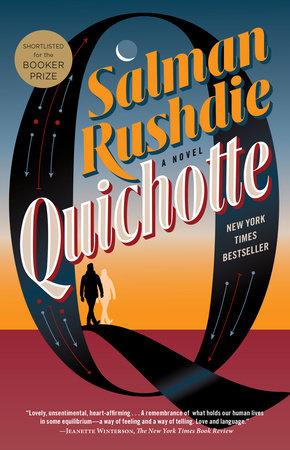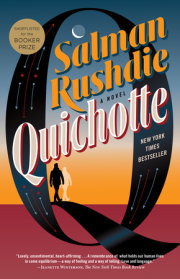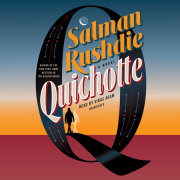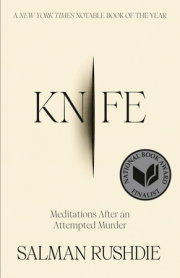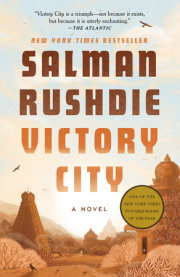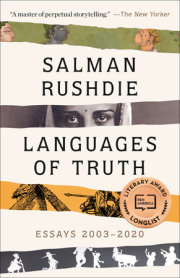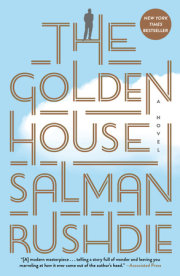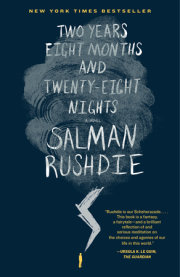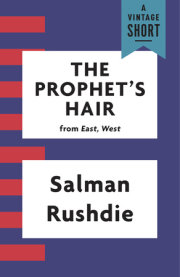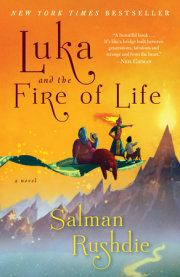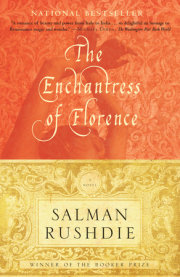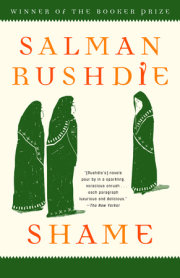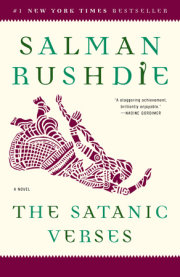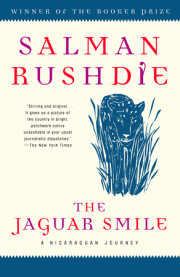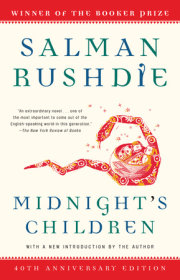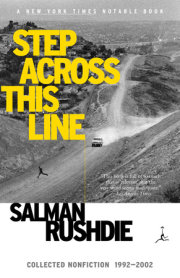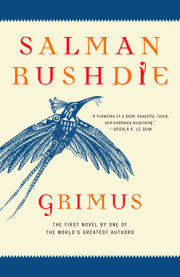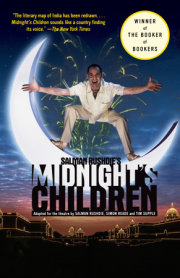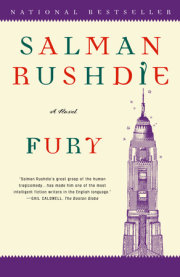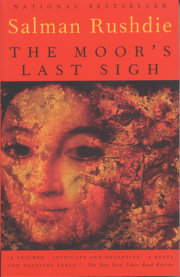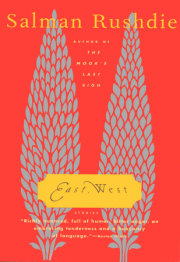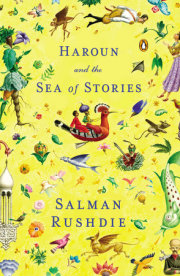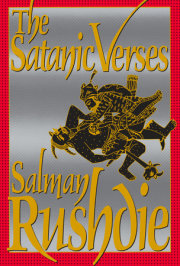Chapter One
Quichotte, an old Man, falls in Love, embarks on a Quest, & becomes a Father
There once lived, at a series of temporary addresses across the United States of America, a traveling man of Indian origin, advancing years, and retreating mental powers, who, on account of his love for mindless television, had spent far too much of his life in the yellow light of tawdry motel rooms watching an excess of it, and had suffered a peculiar form of brain damage as a result. He devoured morning shows, daytime shows, late-night talk shows, soaps, situation comedies, Lifetime movies, hospital dramas, police series, vampire and zombie serials, the dramas of housewives from Atlanta, New Jersey, Beverly Hills, and New York, the romances and quarrels of hotel-fortune princesses and self-styled shahs, the cavortings of individuals made famous by happy nudities, the fifteen minutes of fame accorded to young persons with large social media followings on account of their plastic-surgery acquisition of a third breast or their post-rib-removal figures that mimicked the impossible shape of the Mattel company’s Barbie doll, or even, more simply, their ability to catch giant carp in picturesque settings while wearing only the tiniest of string bikinis; as well as singing competitions, cooking competitions, competitions for business propositions, competitions for business apprenticeships, competitions between remote-controlled monster vehicles, fashion competitions, competitions for the affections of both bachelors and bachelorettes, baseball games, basketball games, football games, wrestling bouts, kickboxing bouts, extreme sports programming, and, of course, beauty contests. (He did not watch “hockey.” For people of his ethnic persuasion and tropical youth, hockey, which in the USA was renamed “field hockey,” was a game played on grass. To play field hockey on ice was, in his opinion, the absurd equivalent of ice-skating on a lawn.)
As a consequence of his near-total preoccupation with the material offered up to him through, in the old days, the cathode-ray tube, and, in the new age of flat screens, through liquid-crystal, plasma, and organic light-emitting diode displays, he fell victim to that increasingly prevalent psychological disorder in which the boundary between truth and lies became smudged and indistinct, so that at times he found himself incapable of distinguishing one from the other, reality from “reality,” and began to think of himself as a natural citizen (and potential inhabitant) of that imaginary world beyond the screen to which he was so devoted, and which, he believed, provided him, and therefore everyone, with the moral, social, and practical guidelines by which all men and women should live. As time passed and he sank ever deeper into the quicksand of what might be termed the unreal real, he felt himself becoming emotionally involved with many of the inhabitants of that other, brighter world, membership in which he thought of as his to claim by right, like a latter-day Dorothy contemplating a permanent move to Oz; and at an unknown point he developed an unwholesome, because entirely one-sided, passion for a certain television personality, the beautiful, witty, and adored Miss Salma R, an infatuation which he characterized, quite inaccurately, as love. In the name of this so-called love he resolved zealously to pursue his “beloved” right through the television screen into whatever exalted high-definition reality she and her kind inhabited, and, by deeds as well as grace, to win her heart.
He spoke slowly and moved slowly too, dragging his right leg a little when he walked—the lasting consequence of a dramatic Interior Event many years earlier, which had also damaged his memory, so that while happenings in the distant past remained vivid, his remembrances of the middle period of his life had become hit-and-miss, with large hiatuses and other gaps which had been filled up, as if by a careless builder in a hurry, with false memories created by things he might have seen on TV. Other than that, he seemed in good enough shape for a man of his years. He was a tall, one might even say an elongated, man, of the sort one encounters in the gaunt paintings of El Greco and the narrow sculptures of Alberto Giacometti, and although such men are (for the most part) of a melancholy disposition, he was blessed with a cheerful smile and the charming manner of a gentleman of the old school, both valuable assets for a commercial traveler, which, in these his golden years, he became for a lengthy time. In addition, his name itself was cheerful: It was Smile. Mr Ismail Smile, Sales Executive, Smile Pharmaceuticals Inc., Atlanta, GA, it said on his business card. As a salesman he had always been proud that his name was the same as the name of the corporation whose representative he was. The family name. It lent him a certain gravitas, or so he believed. This was not, however, the name by which he chose to be known during his last, most foolish adventure.
(The unusual surname Smile, by the by, was the Americanized version of Ismail, so the old traveling salesman was really Mr. Ismail Ismail, or, alternatively, Mr. Smile Smile. He was a brown man in America longing for a brown woman, but he did not see his story in racial terms. He had become, one might say, detached from his skin. This was one of the many things his quest would put in question, and change.)
The more he thought about the woman he professed to love, the clearer it became to him that so magnificent a personage would not simply keel over with joy at the first declaration of amour fou from a total stranger. (He wasn’t as crazy as that.) Therefore it would be necessary for him to prove himself worthy of her, and the provision of such proofs would henceforth be his only concern. Yes! He would amply demonstrate his worth! It would be necessary, as he began his quest, to keep the object of his affections fully informed of his doings, and so he proposed to begin a correspondence with her, a sequence of letters which would reveal his sincerity, the depth of his affections, and the lengths to which he was ready to go to gain her hand. It was at this point in his reflections that a kind of shyness overtook him. Were he to reveal to her how humble his station in life truly was, she might toss his letter in the trash with a pretty laugh and be done with him forever. Were he to disclose his age or give her details of his appearance, she might recoil from the information with a mixture of amusement and horror. Were he to offer her his name, the admittedly august name of Smile, a name with big money attached to it, she might, in the grip of a bad mood, alert the authorities, and to be hunted down like a dog at the behest of the object of his adorations would break his heart, and he would surely die. Therefore he would for the moment keep his true identity a secret, and would reveal it only when his letters, and the deeds they described, had softened her attitude toward him and made her receptive to his advances. How would he know when that moment arrived? That was a question to be answered later. Right now the important thing was to begin. And one day the proper name to use, the best of all identities to assume, came to him in that moment between waking and sleeping when the imagined world behind our eyelids can drip its magic into the world we see when we open our eyes.
That morning he seemed to see himself in a dream addressing himself awake. “Look at yourself,” his half-sleeping self murmured to his half-waking self. “So tall, so skinny, so ancient, and yet you can’t grow anything better than the straggliest of beards, as if you were a teenager with spots. And yes, admit it, maybe a little cracked in the head, one of those head-in-the-clouds fellows who mistakes cumulus, or cumulonimbus, or even cirrostratus formations for solid ground. Just think back to your favorite piece of music when you were a boy! I know, these days you prefer the warblings you hear on American Idol or The Voice. But back in the day, you liked what your artistic father liked, you adopted his musical taste as your own. Do you remember his favorite record?” Whereupon the half-dream-Smile produced, with a flourish, a vinyl LP which half-awake-Smile recognized at once. It was a recording of the opera Don Quichotte by Jules Massenet. “Only loosely based on the great masterpiece of Cervantes, isn’t it,” mused the phantom. “And as for you, it seems you’re a little loosely based yourself.”
It was settled. He climbed out of bed in his striped pajamas—more quickly than was his wont—and actually clapped his hands. Yes! This would be the pseudonym he would use in his love letters. He would be her ingenious gentleman, Quichotte. He would be Lancelot to her Guinevere, and carry her away to Joyous Gard. He would be—to quote Chaucer’s Canterbury Tales—her verray, parfit, gentil knyght.
Copyright © 2019 by Salman Rushdie. All rights reserved. No part of this excerpt may be reproduced or reprinted without permission in writing from the publisher.

